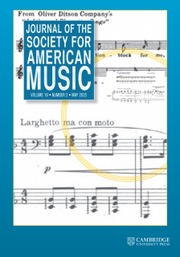No CrossRef data available.
Article contents
The Search for the Past: Postmodern Historical Consciousness in the Operas of Istvan Anhalt
Published online by Cambridge University Press: 31 October 2013
Abstract
The literature on the Hungarian-Canadian composer Istvan Anhalt (1919–2012) has centered on Anhalt's immigrant status and on the connections between his life story and his creative work—deservedly so, as his compositions reflect an interest in issues of displacement, memory, and the relationship between the present and the past. These biographical and geographical themes, however, have yet to be explored as they have been expressed temporally in his music. An examination of his historically based operas, La Tourangelle (1975) and Winthrop (1986) through literary theorist Steven Connor's lens of contemporality reveals the ways in which these works reflect a postmodern conception of temporality and experience. Through their temporal flexibility, these operas demonstrate the genre's ability to express historical processes and experience in a way that literary accounts cannot. The models of subjectivity and contemporality expressed in these works moreover reflect the composer's own complex identity as one that celebrates the continued life of the past in the present.
- Type
- Research Article
- Information
- Copyright
- Copyright © The Society for American Music 2013


